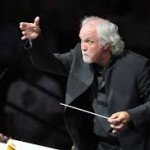Sunday 4 August 2013
BBC Scottish Symphony Orchestra, Chorus of the Deutsche Oper Berlin, Donald Runnicles
Donald Runnicles is a past-master at bringing excitement to Wagner performances, and this was in evidence throughout an impassioned reading of Tannhauser, with exemplary orchestral textures and ravishing choral singing.
The edition used drew on the strengths of all available versions, uniting the full Venusberg music with the often cut choral sections and some minor characters. This allows us to wallow in the re-writing with its heady Tristanesque passages as well as enjoying the Weberlike passages in act two. I have never found this disparity problematic as it reflects the differences between the Landgrave’s conservative court and the potential anarchy of the Venusberg.
With so much so good, it was a pity that at the heart of the evening lay its one weakness. Robert Dean Smith was able to produce pleasant tone which was always in tune as Tannhauser, but his blandness and lack of involvement constantly undermined the electricity around him. In act one this was obvious in his confrontation with Daniela Sindram’s fiery Venus. It was difficult to understand what she saw in this lacklustre character and why he excited her passion. The presence of the many male soloists only made matters worse. Ain Anger provided a noble Landgrave whose authority was absolute, and Christoph Pohl a romantic Wolfram whose complexity of character was never in doubt. Under other circumstances O du, mein holder Abendstern would have merited applause! Thomas Blondelle sang so well as Walter one almost felt it a pity he had not swapped with the lead.
Heidi Melton’s Elizabeth carried easily over the orchestra, filling the hall with beautiful tone as she greeted it. In act two she had no difficulty dominating the ensemble, whereas Dean Smith was often lost. Her prayer in act three was moving as well as beautifully paced.
All soloists were cast from strength with a pure voiced shepherd from Hila Fahima.
Orchestral playing was exemplary througout with the off-stage brass adding the icing on the cake. The Chorus of the Deutsche Oper Berlin, singing without scores, brought great sensitivity, particularly to sections where they are techinically off-stage or moving in ways which require a change of dynamic intensity. Set alongside the other Wagner we have heard this summer this was a fine performance; it could so easily have been near perfect. BH

